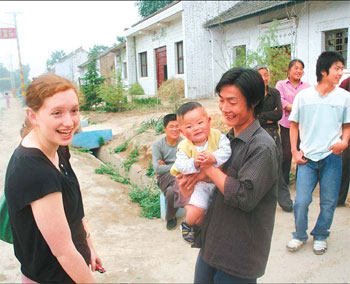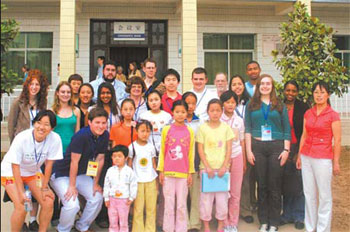| Home / Living in China / Expat Tales | Tools: Save | Print | E-mail | Most Read |
| Lighter Shade of Yale |
| Adjust font size: |
The chance to tour During his 2006 US visit, President Hu Jintao had invited Yale to send a delegation to Smith was among the 100 students and staff chosen, and became an unofficial translator during the 10-day trip in May. Smith was already acquainted with
Erica Smith talks with local farmers at The group toured major historical sites in "This family experience is a full combination of everything that I wanted to do, and show my friend, who is new to "It is just my perfect goal. Talking with peer students in For Hannah Collins, a music graduate student with a Chinese background, the trip inspired her to delve into her heritage. Collin's grandfather was a native of "Having Chinese heritage but not being able to speak Chinese, I feel ashamed about it," Collins said. "Being here, I realize that learning Chinese, which is intimidating in the Collins said she now planned to study the language on returning to the She was impressed by a meeting with a local student at Xi'an Jiaotong University. "She is so informative," Collins said. "As a medical student, she knows a lot about international policies and situations, such as global warming." At Their conversation gave Smith greater understanding of the contrast between a Chinese college student's life and her own. She came away with new respect for the pressure these students face, from entrance exams onwards. "The idea of college here is very different with ours from the beginning," Smith said. "At the campus in the "I don't think I can do what the Chinese students do. I give them credit for being so dedicated to study." The Yale delegation discovered rural The college guests were invited to visit farmers' homes in groups of about ten. Sitting on wooden chairs in the living room of Li Junshe's two-storey house, the curious guests quizzed the 53-year-old on every aspect of a farmer's life, from annual income to the places he'd seen. Elissa Berwick, 19, a sophomore student majoring in physics, asked most of the questions, and was impressed by the farmers' emphasis on their children's education. "They spend all their incomes on their children's education, which is a beautiful action," she said. Having noticed the big TV in the living room, Berwick asked what programs they watched. "With the cable TV, we can watch 51 channels," Li replied. "Usually we watch the programs that teach us agricultural knowledge." "I don't have cable TV at home," Berwick murmured. "Certainly the village is not a poor village in "But it is crucial for us not only go to fancy places in big cities and to meet fancy people who speak perfect English," she said.
Yale students visit a primary school in a village near Berwick said "But in many ways, Yale's vice-president Bruce Alexander said the rural trip exposed the students to another side of "It is important because we know there are two Yale's assistant secretary Fawn Wang said: "Seeing is believing." "Students had met the decision makers and the ordinary people in Erica Smith said she hoped to return in the near future, and find work in either "The past several days showed us what "Every student has been so impressed and so overwhelming by how honest and generous Chinese people are." ( |
| Tools: Save | Print | E-mail | Most Read |
 |
| Related Stories |
|

